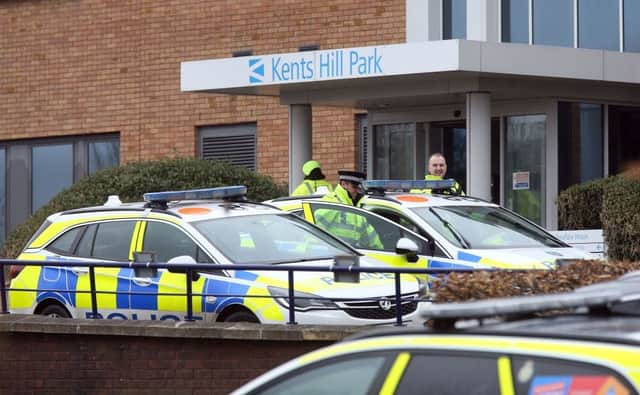Here's what the police can do if you have coronavirus symptoms but don't self-isolate


The UK government have proposed a new bill which would provide authorities with new powers to help stem the spread of Covid-19 – and it could see people suspected of having the disease detained.
People experiencing key symptoms of coronavirus – a continuous or persistent cough, and a high temperature – have been told to self-isolate for seven days in order to prevent the spread of the disease.
Advertisement
Hide AdAdvertisement
Hide AdThough most members of the public appear to be complying with the new measures, there have been instances of people ignoring the authorities, potentially putting others at risk.
New legislation proposed by the government, however, could see people punished for failing to self-isolate if it is suspected that they are carrying the disease.
What is the coronavirus bill?
The Coronavirus Bill is proposed legislation which would provide the government with emergency powers to tackle the spread of Covid-19.
Described by Health Secretary Matt Hancock as "proportionate to the threat we face", the powers are time limited to two years.
Advertisement
Hide AdAdvertisement
Hide AdThe emergecy legislation could allow the government to close airports and fast track medical students through their qualifications in order to defend the public against the coronavirus. The Coronavirus Bill would be in place for two years and provide the government with unprecedented powrs including the ability
It is expected that he bill will be rushed through parliament early next week.
So, could I be punished for failing to self-isolate?
Yes.
The measures in any other era may appear draconian, but given the special circumstances the government have deemed them necessary.
They stipulate that if a member of the public is thought to be carrying Covid-19 they can be detained by authorities, such as the police, immigration and public health officers.
Advertisement
Hide AdAdvertisement
Hide AdIf a person is suspected of carrying the disease, but is unwilling to be tested for its presence they could be slapped with a £1,000 fine.
The coronavirus bill would allow public health officers to order someone potentially infected to partake in screening and testing within two weeks. They would be required to provide a travel history as well as biological samples.
Health and police officers will also have the power to force someone into isolation, limit their travel and prohibit their interaction with others and participation in activities.
The measures will only be enforced if a direct threat is posed to public health.
Advertisement
Hide AdAdvertisement
Hide AdThe bill states: “The proposals will provide public health officers, constables and (in some circumstances) immigration officers with the means to enforce sensible public health restrictions, including returning people to places that they have been required to stay.”
What is coronavirus?
COVID-19 is a respiratory illness that can affect lungs and airways. It is caused by a virus called coronavirus.
What caused coronavirus?
The outbreak started in Wuhan in China in December 2019 and it is thought that the virus, like others of its kind, has come from animals.
How is it spread?
As this is such a new illness, experts still aren’t sure how it is spread. But.similar viruses are spread in cough droplets. Therefore covering your nose and mouth when sneezing and coughing, and disposing of used tissues straight away is advised. Viruses like coronavirus cannot live outside the body for very long.
What are the symptoms?
Advertisement
Hide AdAdvertisement
Hide AdThe NHS states that the symptoms are: a dry cough, high temperature and shortness of breath - but these symptoms do not necessarily mean you have the illness. Look out for flu-like symptoms, such as aches and pains, nasal congestion, runny nose and a sore throat. It’s important to remember that some people may become infected but won’t develop any symptoms or feel unwell.
What precautions can be taken?
Washing your hands with soap and water thoroughly. The NHS also advises to cover your mouth and nose with a tissue or your sleeve (not your hands) when you cough or sneeze; put used tissues in the bin immediately and try to avoid close contact with people who are unwell. Also avoiding touching eyes, nose and mouth unless your hands are clean.
Government advice
As of Monday 16 March the government advised that everyone should be observing social distancing - avoiding unnecessary travel and working from home where possible. Anyone with a cough or cold symptoms now needs to self-isolate with their entire household for 14 days.
The government has also advised against going to the pub, out for dinner or partaking in any socialising with large groups. This has caused a number of closures across the country. Schools will close from Friday 20 March for the foreseeable future and exams have been cancelled.
Advertisement
Hide AdAdvertisement
Hide AdThe over 70s or anyone who is vulnerable or living with an underlying illness are being asked to be extra careful and stay at home to self-isolate.
For more information on government advice, please check their website- https://www.gov.uk/government/topical-events/coronavirus-covid-19-uk-government-response
Should I avoid public places?
The advice now is to avoid public places and any non-essential travel. Travel abroad is also being advised against for the next 30 days at least, and many European countries have closed their borders.
What should I do if I feel unwell?
Don’t go to your GP but instead call NHS 111 or look online at the coronavirus service that can tell you if you need medical help and what to do next. https://111.nhs.uk/covid-19
When to call NHS 111
Advertisement
Hide AdAdvertisement
Hide AdNHS 111 should be used if you feel unwell with coronavirus symptoms, have been in a country with a high risk of coronavirus in the last 14 days or if you have been in close contact with someone with the virus.
Sources: World Health Organisation and NHS